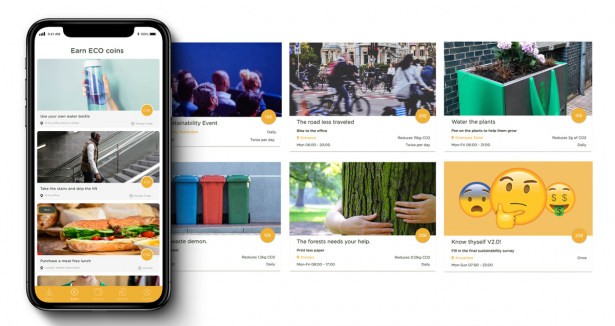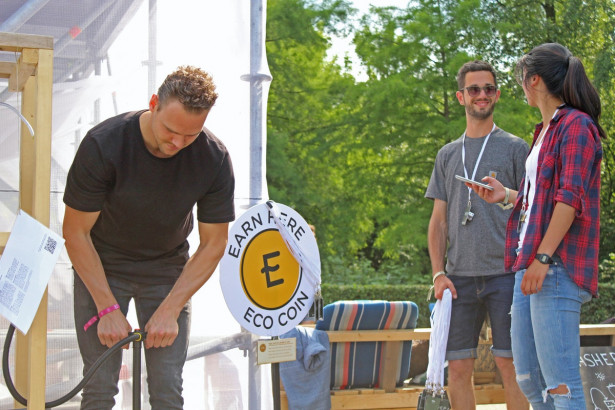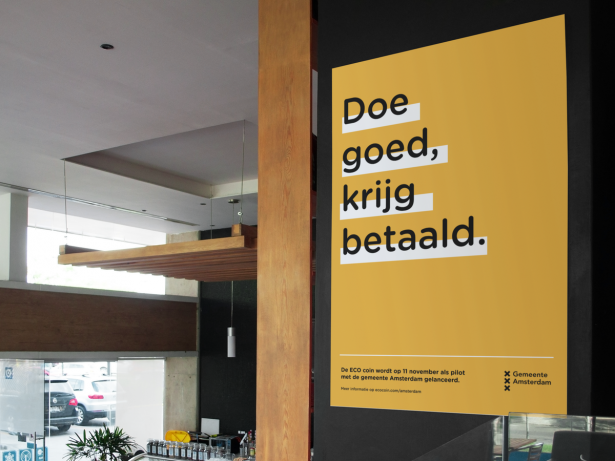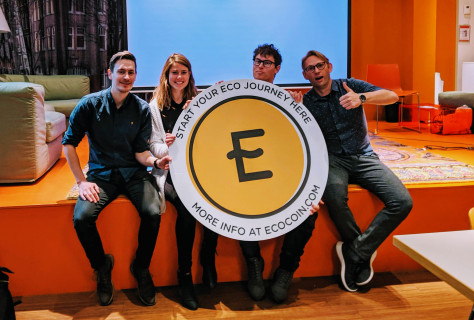Throughout the week of the Circular Economy, we are shining a spotlight on inspiring sustainable initiatives in the Netherlands. Joining forces with startups, social entrepreneurs, creative professionals, leading companies, and forward thinking governments, to showcase what a circular economy can look like. Meet the pioneers, learn from them and get inspired! Closing this series: Lewis Just. He talks us through ECO coin, an alternative currency earned through sustainable actions.
Throughout the week of the Circular Economy, we are shining a spotlight on inspiring sustainable initiatives in the Netherlands. Joining forces with startups, social entrepreneurs, creative professionals, leading companies, and forward thinking governments, to showcase what a circular economy can look like. Meet the pioneers, learn from them and get inspired! Closing this series: Lewis Just. He talks us through ECO coin, an alternative currency earned through sustainable actions.
How did you become involved with the ECO coin?
The ECO coin emerged from a workshop in Brazil led by Next Nature Network . The group noticed an imbalance within our economic and ecological system:: people could get money from cutting down a tree, but no one was actually paying them to grow or protect the forest. What if we paid people for their sustainable actions and rewarded them to protect or grow the ecological surroundings, instead of the other way around? Next Nature Network took this idea back to Amsterdam to further develop it. Here my personal story comes in: I’ve always been fascinated by both community currencies and the rise of cryptocurrencies. I’m originally from Scotland and had been working in London for a while, but missed a sense of real impact in my day-to-day job. So I moved to Amsterdam on a whim in 2016, and had the opportunity to start working on evolving the ECO coin from an idea to a business of its own.
What is the ECO coin?
It is a digital community currency earned through sustainable actions. There are different sustainable actions, or missions that you can do to earn ECO coins, which are customized depending on the context or organization we are working with. Missions range from eating a meat- free meal to recycling plastic bottles or taking the bike instead of the car. Each mission is priced in ECO coins. The more impact the mission has, the more ECO coins you get. Once you’ve earned your ECOs they can then be spent on sustainable services, exclusive experiences and circular products.
The first time the ECO coin was earned and spent was at DGTL festival. That was quite exciting because we’d just started to formalize the concept, and then suddenly had only eight weeks to build the entire system as a digital platform. We used the festival’s NFC wristbands to ‘store’ the ECOs. Now, we’ve moved away from NFC and created a standalone web app, which makes it more applicable to different contexts.

How do you determine the value of an action?
We calculate the impact and translate it into one value: CO2e (the “e” standing for equivalent). For example, we can calculate the difference between a veggie meal versus a meal with and that way come to the avoided CO2-emissions. It’s still generalized, but we’re trying to go further into detail by integrating data that is out there anyways – such as the exact distance you’re biking. The more information we have, the more we can steer people a certain way by showing them the options and related impact. Although it’s really based on the idea of using certain types of data, we’ve always been very aware of privacy issues and are explicit on what part of someone’s data we use.
How do you measure your own impact on the circular economy?
We’ve done seven implementations so far, ranging from large corporates such as booking.com and L’Oréal to organizations like Erasmus University Rotterdam and the City of Amsterdam. We calculate our impact mainly in terms of avoided CO2e per month, monitoring the amount of actions carried out. For instance, at the municipality we reduced 10 tons of CO2e per month with only 150 people carrying out more than 5000 actions. For every action chosen over another action, we are also able to calculate savings in water reduction, energy, and waste. These is the hard data of our impact – but we go further than that. Social impact is a key aspect for us as well, although harder to quantify. It’s a huge win that companies like booking.com are wanting to collaborate, and apparently value sustainability so much that they want to incentivize their employees to act more sustainably. These companies often have global supply chains and so massive potential for impact on transitioning to a circular economy. We always conduct an analysis of an organization before and after implementing the ECO coin, and these almost always show that mindsets have actually shifted. Circular thinking has often really gotten into the DNA of the company. What’s more, even though we focus on working life, the project often leads to attitude change that is also reflected in people’s private life.
Is the ECO coin limited to organizations, or can you also join as a group of friends or neighbors?
We're interested in various types of communities. It's interesting because each community expects something different from using the ECO coin, so you have to co-create it with them. For some parties, it's really about mobility and how people are getting to work, while for others it can be about teaching their employees to separate waste. Eventually we hope to have the platform open to individuals as well, really thinking in larger closed-loop systems, but at this point that’s still more a dream than reality. At this point we’ve only worked with organizations, because the ECO coin is not a self-sufficient currency yet; we need budget from these companies to fund the rewards. It’s also a lot more manageable at this scale, especially in these initial phases when we’re still constantly developing.
We’re currently scaling up and running a pilot with an entire neighborhood (the Knowledge Mile area). This is a neighborhood with all kinds of facilities, so you can essentially earn ECO coins in one place and go down the street and spend the same ECOs at a vendor there. It’s a whole new level of community. The idea is to start with the bigger organizations in the area, and then spread to the smaller vendors. If that’s successful, we’ll hopefully start broadening out to eventually include all of Amsterdam.
Can you tell us more about the reward system?
We believe that the currency should be 50% about ecological value and 50% economic value. People fall for different triggers. One thing that really motivates people is being able to see your personal impact in terms of CO2e, by checking your digital ‘wallet’. You can then spend these ECO coins on all kinds of rewards, ranging from a free coffee or cinema tickets to bike services to exclusive meet and greets. We try to make sure these are as sustainable as possible, for example by looking at partners with excess capacity (such as movie theaters). We’ve now also made it possible to donate your ECO coins, or to spend them on community items like solar panels or plants for your office. It's always green for green: you earn in a green way and you spend in a green way. We also gamify things by working with leaderboards, where you can actually win – individually, but also in teams or per organization. This triggers the competition aspect, which works really well for some people who may not be intrinsically motivated in terms of sustainability.

What's been your favorite case so far?
We had some really great results from the L’Oréal implementation. We did a pilot for them last year. It was fascinating because it was the first time we've gone so deep into corporate culture. I think it worked so well because there was already a very competitive atmosphere; they have several divisions, and are always striving to out compete each other. We played into that and grouped the leaderboards per division. That led to really high engagement. You could feel a buzz throughout the whole building, people joking at the coffee machines like ‘oh, how many do you have? I’m buying my coffee today with ECO coins’.
What challenges have you encountered in setting up ECO coin?
Part of it is regulations. The Dutch National Bank is currently passing new regulations on cryptocurrencies, which may limit our future ambitions. I think the challenge is also to get people to see another kind of value system. People really understand euros, because it’s money they've used all their lives. They don’t see the value of other kinds of money until they can actually spend it and get something from it. I would actually argue that we’re using multiple currencies every single day. We just don't think of them as currencies. Think of your loyalty points at a café, or topping up your public transport card. These are technically also tokens or currencies, designated to be used within a specific value system. The ECO coin represents a sustainable value system.
Another challenge we had mainly at the beginning was getting through to organizations to set up partnerships in the first place. Especially as a smaller start-up, it takes a lot of effort and work to connect with the decision makers of these organizations. Something that’s currently still difficult is getting smaller vendors on board for the reward system. Larger companies see it as value that will eventually flow back, and the publicity is often enough for them. We currently tend to pay smaller companies for their products, from the budget that the organization running the ECO coin puts in. We’re now trying to work through other token and business models, such as buy on get one free offers, to eventually move towards a completely self-sufficient system.
How do you see the ECO coin in 10 years?
We’re pretty ambitious. In ten years, we want it to be a genuine alternative system that you would use every day in Amsterdam. It will have become very normal that, when you tap in or tap out somewhere, you choose which currency you want to use – and for sustainable things you’ll be using your ECOs. The goal is also that eventually you’ll be able to exchange your ECO coins into euros, which would add a whole other layer of worth. We have a couple other ideas that we’re currently working out practically. Ideally, every ECO coin will be backed by a tree, just like every euro used to be backed by gold. This could also be a solar panel or wind farm – anything to give it intrinsic value and to double up the CO2 impact. We’ve recently started collaborating with a foundation on the Veluwe that owns 2 million trees, which is a first step in the good direction. We also want our currency to really be a ‘living coin’, meaning every coin will be programmed so that it gradually loses value over time. We do this partly because certain actions will hopefully become more normal and so worth less, but also largely because it drives people to actually go out and spend it. And you’ll be spending it on sustainable products or services, so that speeds up the whole cycle.

What would you recommend starters wanting to set up a sustainability-related company?
Go and connect with all of the amazing initiatives already out there and figure out where you fit within the bigger ecosystem. Transitioning to the circular economy is about joining multiple things up. You can’t work as an isolated company. It’s what I love about working in this field: traditional startups are constantly competing against each other, but as soon as you step into the sustainability world, everyone’s working towards the same goal and it can only be helpful to work together. It gives you a lot of energy.
-----------------------------------------------------------------------------------------------------
This interview series is a collaborative initiative of Metabolic,** AMS Institute, City of Amsterdam, Amsterdam Economic Board and Amsterdam Smart City. Working together within the Amsterdam Smart City platform, these organizations are committed to accelerate the transition to a circular economy.**





great!
Hey @geraldlindner thanks for your question. We actually have been in contact with Heidi Leenaarts from the United Economy to explore how we can collaborate together and how these two economies can work symbiotically for the benefit of all. Together we can go further!
Extreme fragmentation and resulting isolation have always been the Achilles' heel of sustainable initiatives.
Therefore I am very very curious why ECO-coin decided not to use the existing NL framework created by United Economy https://www.unitedeconomy.nl, founded on the fantastic (international) infrastructure developed by Circuit https://www.circuitnederland.nl.
Surely building together forwards is better than reinventing the same wheel over and over again?